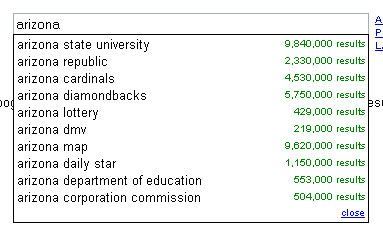 Nearly four years in development, Google today finally rolled out its Search Suggestions product to the main page of Google.com. Suggest started as a 20% project and was launched on Google Labs in December 2004. The feature “graduates” from Labs and will be rolled out to users over the next week or so (I can’t see it yet on Google Australia).
Nearly four years in development, Google today finally rolled out its Search Suggestions product to the main page of Google.com. Suggest started as a 20% project and was launched on Google Labs in December 2004. The feature “graduates” from Labs and will be rolled out to users over the next week or so (I can’t see it yet on Google Australia).
Since launching the project on Labs 4 years ago, Google has launched the search suggest service slowly on some of its other services including the Toolbar, Firefox search box, and YouTube. What took Google so long in bringing it to the homepage? According to Search Engine Land: quality control. “Quality is very important to us, and since so many people visit the Google.com homepage, we wanted to make sure to evaluate and refine our algorithms to provide a good experience using Google Suggest,” a Google rep told SEL.

Search suggestions is actually an area where Google lags behind the competition. A few other search engines had search suggestions when Google began their Suggest project in 2004, and Yahoo! rolled out a major upgrade to their search suggestions, called Search Assist, about a year ago. Yahoo!’s product is actually arguably still a bit more complete than Google’s offering.
Google’s tool works by looking at popularity metrics for the term you appear to be typing, and other terms containing that keyword. Yahoo!’s service does a search in the background for the term you’re typing and pulls out related terms from the first 20 pages of results. Yahoo! also suggests terms based on related concepts — i.e., suggestions that don’t necessarily contain the exact term you were searching. For example, a search for “Batman,” might also suggest searches for “The Dark Knight,” “The Joker,” or “Gotham City.”
Search suggest tools are useful, though, so we’re happy that Google has finally decided to graduate theirs from Labs. As Google product manager Jennifer Liu noted in a blog post today, search suggestions can save searchers time, reduce spelling errors, and help you drill down your searching to more specific and accurate queries.
 Josh Catone
Josh CatoneBefore joining Jilt, Josh Catone was the Executive Director of Editorial Projects at Mashable, the Lead Writer at ReadWriteWeb, Lead Blogger at SitePoint, and the Community Evangelist at DandyID. On the side, Josh enjoys managing his blog The Fluffington Post.




